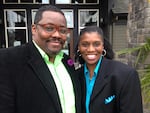
MinNefer Mernahkem and Nancy Thomas moved to Hillsboro knowing they would be raising their son in a very white place.
Anna Griffin / OPB
MinNefer Mernahkem and Nancy Thomas didn’t have friends or family out West when he began prodding her to leave Cincinnati a few years ago. All they really knew about Portland was that it hosts one event on his bucket list: the annual world naked bike ride.
"I said, 'we ought to go for the adventure.' And she was like, 'Look, Indiana Jones. I'm not for the adventure.' And then a year later, a recruiter called her and invited her out. She came out and fell in love," Mernahkem said.
"I visited once and was like, 'Oh yeah, we’re going,'" Thomas said.
She's a lawyer by training who works in computers. He sells a line of men’s specialty grooming products online. They’re both the children of Marines and grew up accustomed to moving around and being newcomers.
That military heritage also made them lifelong Republicans who want smaller government, more personal responsibility and more respect for police. They’ve been accused of – as they term it – not being black enough because of both their politics and how they carry themselves.
"When people see my business Facebook page, the majority of my clientele is white, not because I chose it but because that’s who buys my products. So people make the assumption that I’m white acting," Mernahkem said.
"It’s the same cultural issue we as black people have about being light skinned or dark skinned," Thomas added. "If you talk with the queen's English, which is what I was taught, you sound different from other people."
They bristle at being told they’re “too white," because both say they feel the risks and pain of their skin color.
"As a black man in America, I live in apartheid," he said. "I have to constantly have my papers. My papers is license and registration, to make sure I’m safe."
"And sometimes that doesn’t make you safe," Thomas said.
"If you ever forget you're black, trust me, there are people out there who will remind you," Mernahkem added.
Mernahkem says that back in Cincinnati, he was pulled over by police officers four or five times a month. That hasn’t happened in Oregon. But he has experienced a different sort of racism, one that seems based as much on ignorance as hate.
"I was in an antique shop, I collect watches, so I was looking at watches," Mernahkem said. "I saw these cards that portrayed African Americans with the big lips, the watermelon, the chicken, the whole blackface thing. I was amazed to see that, out here in Hillsboro. A person came to me and said, 'My, that is a great representation of your culture, don't you think?' I said, 'That is the most racist thing you can say for someone. That lets me know you really, truly don't understand African Americans, you don't understand how demeaning that is to a culture.'"
"The truth is they don't have enough exposure to African Americans to even know that they're in the wrong way," Thomas said. "So we have to make decisions like, 'Do we want to explain it to them or do we not?'"
Another decision they need to make: What to tell their son about race.
Thomas and Mernahkem settled in the suburbs of Washington County rather than Portland. They like being closer to wineries and the coast, they preferred the Hillsboro schools and their son was disturbed by how many homeless people he saw when they visited inner Portland.
That choice means raising him in a place where he feels safer, but also where he will almost always be the only black kid in the room. With its booming Latino and Asian populations, Washington County is among the most diverse communities in this fairly monochromatic state. But the African American population is minuscule, around 2 percent. Their son is one of just four black children in an elementary school class of more than 40.
"One time he said to me, 'I'm white,' and I almost had an accident. He said it, and I was like, 'Noooo,'" Mernahkem said.
"But he didn't say it because he thinks he's white," Thomas said. "He said it because he doesn't think in terms of color."
"What I’ve learned is that he's living a different kind of black than I’m living," Mernahkem said of his son. "When I grew up, I didn't have any white friends. I grew up in Chicago, and it was segregated. The only time you encountered whites was if it was a social worker, a police officer or a Jehovah's witness.
"Or as my dad always told me: 'If you're going to go outside the community we live in, there's a strong possibility there will be more of them than there are of you. Accept it, address it, correct it and move on.'"